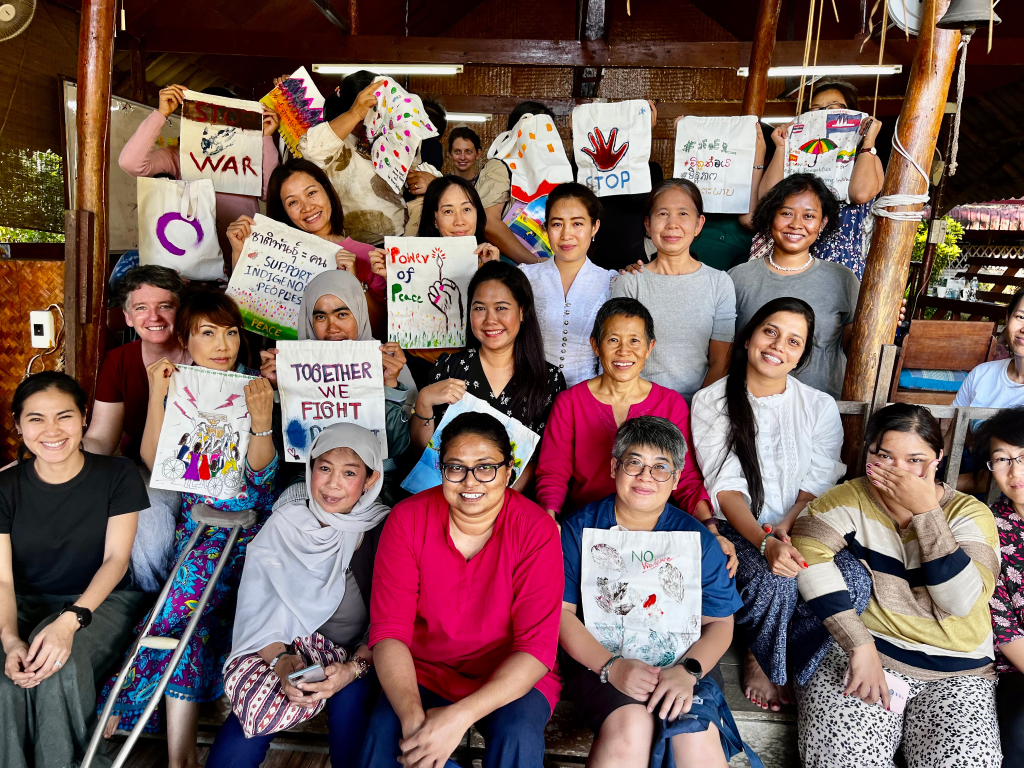(Gathering participants at IWP’s Training Center north of Chiang Mai, Thailand)
The Women Peacebuilders Gathering was uniquely designed to become a regional platform for women building peace in the South and Southeast Asia region. The gathering is an initiative under the Regional Network for Peacebuilders project funded by USAID. The International Network of Engaged Buddhists (INEB) collaborated with its partner the International Women Partnership for Peace and Justice (IWP) based in Chiang Mai, Thailand, on the gathering. IWP both hosted and facilitated the gathering. FHI360 partner staff also supported it.
Twenty-five participants came from 5 countries: Myanmar (8), Thailand (7), Sri Lanka (4), Laos (3), and Cambodia (3) and were from 30 – 70 years of age with diverse backgrounds and experiences. The participants identified as mostly Buddhist (13), with a few Muslims, Christians, one atheist, and six persons who preferred not to say. These included women with disabilities, representatives from queer communities, indigenous women, and women working in conflict zones.
The seven-day gathering was uniquely designed to enable participants to deeply explore and apply the feminist leadership principles in their day-to-day peacebuilding and development practices. The event successfully created a safe and empowering space for peace practitioners. For example, one participant from Myanmar mentioned that “I haven’t made friends for two years, I didn’t trust anyone, and you have brought me back.”
INEB’s commitment to creating a safe space and deepening work with women is aligned with and furthers Network for Peace’s Amplifying Women’s Moderate Voices Activity, the Women, Peace, and Security Act of 2017, USAID’s WPS Strategy, and the U.S. Strategy to Support Women and Girls at Risk of Violent Extremism and Conflict.
The gathering was designed to nurture the participants as a learning community which could transition into a regional network for women peacebuilders.
The outcomes are summarized as follows:
- Creating a safe space through emphatic and non-judgmental listening, and building trust. Participants’ mindfulness practices were strengthened through deep listening and reflection.
- Enhancing participants’ understanding of marginalization, structural barriers, and oppression to build solidarity for peace and justice in the region. They formed country groups where they shared strategies, challenges, and successes for empowering marginalized groups and building peace. The women peacebuilders shared interventions to promote peace and social justice by using bottom-up inclusive nonviolent approaches and more. They also learned more about gender equality and social inclusion (GESI) in a session dedicated to this.
- The value of reflective practice during the gathering as a means of understanding more deeply about social movements; how religious institutions and leaders contribute to structural violence; and the need to develop allies and strategies to connect with diverse marginalized groups that an catalyze movements for social change.
- Power-sharing practices are the most effective empowerment model. Viewing the documentary film Pray the Devil Back to Hell about a Liberian peace movement called Women of Liberia Mass Action for Peace inspired the participants that positive societal change is possible in their home countries.
- Redefine and value self-care as a key strategy to build and sustain peace during which participants explored their suffering feeling and its implication on their health and wellbeing. Most participants agreed that political, socio- economic factors and gender socialization rooted in patriarchal systems put pressure on them that impacts their wellbeing.
- Shared knowledge of many diverse locally led strategies to build peace, resilience, and resistance in an open space. An ‘Empowering Self Defense’ was also offered which interested all the participants including a participant with disabilities and a Bhikkhuni. Then during Solidarity Night’ Iranian female advocates and Burmese women activists were invited to share their experiences when in advocating for peace and justice in their own countries. This uniquely demonstrated why solidarity is needed to achieve peace and justice.
- Mapping allies and powering peacebuilding and social movements with creativity. Momentum from the empowering self-defense and solidarity night helped energize the participants through identifying local, regional, and global civil society organizations that share common value and goals, and later to map their allies and partnerships in promoting social justice and peace.
- Developing an action plan for the women peacebuilders network which included the following activities:
- Conduct empowering self-defense workshop for women peacebuilders in camps for internally displaced persons (IDPs) and refugees along the Thailand and Myanmar border.
- Conduct knowledge sharing activities and form a women peacebuilders network in Sri Lanka in January 2023.
- Develop a five-year strategy as a learning and exchange platform for women peacebuilders in the South and Southeast Asia region
The next phase of the Women Peacebuilders project is to develop a documentary film of participants in their home countries and learn about their peacebuilding activities.






